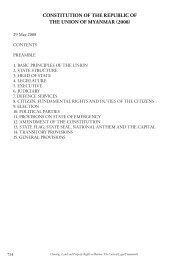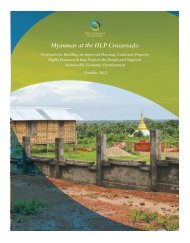THE TENANCY LAW (1963) - Displacement Solutions
THE TENANCY LAW (1963) - Displacement Solutions
THE TENANCY LAW (1963) - Displacement Solutions
You also want an ePaper? Increase the reach of your titles
YUMPU automatically turns print PDFs into web optimized ePapers that Google loves.
[Unofficial Translation]<br />
<strong>THE</strong> <strong>TENANCY</strong> <strong>LAW</strong> (<strong>1963</strong>)<br />
Law No. 8, <strong>1963</strong><br />
[Exact Date Unknown]<br />
The Chairman of the Union of Burma Revolutionary Council has prescribed the following<br />
Law.<br />
1. This law shall be called the Tenancy Law, <strong>1963</strong>.<br />
2. This Law shall extend to the whole of the Union of Burma and shall come into force at<br />
once.<br />
(a) “Government land” means the present land or land for agricultural purpose.<br />
(b) “Agricultural Land” means either land used for cultivation or possessed for an agricultural<br />
purpose.<br />
Explanation 1: The expression includes what in common usage are identified as paddy or<br />
hillside fields, or silt land; or rubber or palm plantations, or orchards; or vegetable or flower<br />
gardens; or island or alluvial lands.<br />
Explanation 2: The expression does not include private residences, religious buildings and<br />
compounds, or unused public cultivation plots inside a township or village boundary.<br />
Explanation 3: The expression is inclusive of structures built upon agricultural land.<br />
(c) “Rent for cultivation” means wages given to a land owner because of the benefit gained<br />
by cultivating on the land.<br />
(d) “Land tax” means supervision fees (levy) of the government according to government<br />
land and tax law or Upper Burma land and Tax regulation law. According to Irrigation Act<br />
law it does not include the supply of water to the field.<br />
(e) “Tenant farmer” means the responsible person who pays rent for cultivating on the land.<br />
Exaplanation: The expression includes a relevant organization.<br />
(f) ”Landlord” means a person or an organization who owned the field or farm according to<br />
the Land and Tax act law or Upper Burma Land and tax regulation law. Landlord includes<br />
the representative of the land owner.<br />
(g) ”Demarcate” means fixing according to this law and bye-law.<br />
Housing, Land And Property Laws In Force<br />
561
3. In applying the provisions of this Act, the decision of the authority appointed by the<br />
government is final.<br />
4. The government may announce the renting of any field or land from a specific date<br />
specified in the announcement. At that date the right to rent of the landlord will end.<br />
(1) The tenant farmer of the government or landlord must pay tax to the landlord at the<br />
following rates:<br />
(a) Renting fee is the same wage as cultivating rice for the year.<br />
(b) Renting fee is three times the wage for cultivating Chili, Onion and Virginia in the year<br />
or the special crop rate of Sugar cane.<br />
(c) Renting fee is two times the wage of cultivating Chili, Onion and Virginia in the year.<br />
(2) As prescribed in sub-section (1), the rent for cultivating a farm is noted as the renting<br />
fee for the whole year of cultivation. The tenant farmer is not responsible to pay additional<br />
rent fees for cultivating multiple crops or subsidiary crop on that land in the same year.<br />
(3) The Renting fee shall be paid in cash.<br />
5. The specified compensation fee should be given to the landlord, where the benefit to the<br />
landlord is decreased due to the tenant’s failure to do a normal task or other reason which<br />
leads to the destruction of the paddy dike, drain, well and pond.<br />
6. The government may specify the rules and regulations for the tenant cultivating on<br />
government land.<br />
The government may specifically appoint any person or organization to carry out the<br />
provisions of this Act and such persons may hand over the power assigned to them to<br />
another person or organisation except the bylaw.<br />
Lay down order by power transferred person or organization or once again power transferred<br />
people or organization by section (7), cannot refuse to accept in any civil court or revenue<br />
office. Appeal can make in any legally specified organization.<br />
No suit or other proceeding shall be commenced or prosecuted against any person for<br />
anything done in pursuance of this Act,<br />
Any person or organization who has transferred power or once again transferred power<br />
in accordance with Section (7) can be sentenced to six months in prison or fined three<br />
hundred kyat or both if fails to cultivate on the rented land without sufficient reason or<br />
rent to another person.<br />
562 Housing, Land and Property Rights in Burma: The Current Legal Framework
Any person or organization who has transferred power or once again transferred power<br />
in accordance with Section (7) can be sentenced to six months in prison or fined three<br />
hundred kyat or both if inhibit the working process of this law by himself.<br />
Any person may issue directives for daily working process according to this law or bye-law.<br />
(1) The government may issue directives for the daily working processes under this law or<br />
relevant bye-laws.<br />
(2) The government may hand over the conferred power to any person or organization<br />
under sub-section (1).<br />
The government may issue bye-laws and notifications to carry out the works of this Act.<br />
7. The 1953 Renting Land for Cultivation Act is hereby repealed.<br />
(1) Works carried out under the 1953 Renting Land for Cultivation Act are not nullified.<br />
Unfinished works may be resolved.<br />
Housing, Land And Property Laws In Force<br />
563













